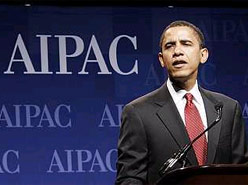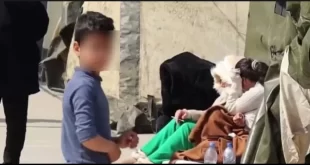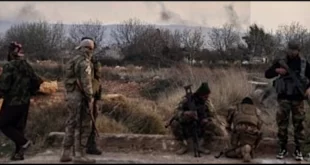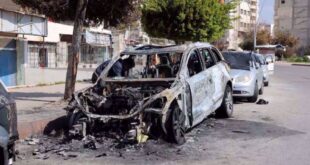Sep 21, 2013, Global Research
Obama intends waging war on Syria. Russia’s efforts delayed it. An uneasy calm before the storm prevails.
Shock and awe attacks are planned. They could come any time. Pretexts are easy to create. False flags are longstanding US policy. So are Big Lies. Regime change is prioritized. Obama intends getting it one way or another.
In mid-September, Russia, China, and other Shanghai Cooperation Organization (SCO) members and observer states met in Bishkek, Kyrgyzstan.
Vladimir Putin said “military interference from outside the country without a UN Security Council sanction is inadmissible.”
The summit’s joint declaration opposes “Western intervention in Syria, as well as the loosening of the internal and regional stability in the Middle East.”
SCO prioritizes international “reconciliation.” It wants peaceful conflict resolution. It supports convening Geneva II as soon as possible. Washington has other ideas.
On September 19, John Kerry hinted at what’s coming. He addressed reporters. He did so in the State Department’s press briefing room.
”We really don’t have time today to pretend that anyone can have their own set of facts approaching the issue of chemical weapons in Syria,” he said.
“This fight about Syria’s chemical weapons is not a game. It’s real. It’s important.”
”It’s important to the lives of people in Syria. It’s important to the region. It’s important to the world that this be enforced – this agreement that we came out of Geneva with.”
”(T)hanks to this week’s long-awaited UN report, the facts in Syria only grew clearer and the case only grew more compelling.”
“The findings in the Sellstrom report were as categorical as they were convincing.”
“Every single data point – the types of munitions and launchers that were used, their origins, their trajectory, their markings, and the confirmation of sarin – every single bit of it confirms what we already knew and what we told America and the world.”
“It confirms what we have brought to the attention of our Congress, the American people, and the rest of the world.”
”The UN report confirms unequivocally that chemical weapons, including the nerve agent sarin, were used in Syria.”
”And despite the regime’s best efforts to shell the area and destroy the evidence, the UN interviewed more than 50 survivors – patients, victims, health workers, first responders.”
”They documented munitions and subcomponents. They assessed symptoms of survivors, analyzed hair, urine, blood samples.”
”And they analyzed 30 soil and environmental samples.”
“And what did they learn? They returned with several crucial details that confirmed that the Assad regime is guilty of carrying out that attack, even though that was not the mandate of the UN report.”
“But anybody who reads the facts and puts the dots together, which is easy to do – and they made it easy to do – understands what those facts mean.”
“We know the Assad regime possesses sarin and there’s not a shred of evidence, however, that the opposition does.”
So there you have it. Sarin was used. Sarin killed. The world can decide whether it was used by the regime, which has used chemical weapons before, the regime which had the rockets and the weapons, or whether the opposition secretly went unnoticed into territory they don’t control to fire rockets they don’t have containing sarin that they don’t possess to kill their own people.”
”And then without even being noticed, they just disassembled it all and packed up and got out of the center of Damascus, controlled by Assad.”
”Please. This isn’t complicated. When we said we know what is true, we meant it. And now, before I head to New York for the UN General Assembly, we have a definitive UN report strengthening the case and solidifying our resolve.”
“Now the test comes. The Security Council must be prepared to act next week.”
“It is vital for the international community to stand up and speak out in the strongest possible terms about the importance of enforceable action to rid the world of Syria’s chemical weapons.”
“So I would say to the community of nations: Time is short. Let’s not spend time debating what we already know.”
“We need to make the Geneva agreement meaningful and to make it meaningful in order to eliminate Syria’s CW program and to do it with transparency and with the accountability, the full accountability that is demanded here.”
“It is important that we accomplish the goal in New York and accomplish it as rapidly as possible.”
Fact check
Kerry repeated one Big Lie after another. He restated much of what he said before. Each time reflected a Colin Powell moment. He turned truth on its head consistently. He does it every time he speaks.
Throughout months of conflict, no evidence links Assad to chemical weapons use. Plenty shows insurgents used them multiple times.
They bear fully responsibility for attacking Ghouta. Claiming they have no access to sarin or other chemical weapons doesn’t wash.
Kerry knows it. He lied saying otherwise. Sarin containing rockets came from insurgent-held territory. Pro-Assad civilians were targeted.
Why would Assad attack his supporters? Why would he do it with UN inspectors close by? Why would he risk harming his own soldiers and innocent civilians?
Why would he need to use chemical weapons? He’s effectively routing insurgent fighters. He’s doing it consistently.
The UN inspectors report is suspect. It’s rife with inconsistencies. It’s one-sided. It willfully deceives. It was a rush job. It was sloppy, tainted and worthless.
Crucial evidence absolving Assad was ignored. The alleged crime scene was corrupted. Alleged munitions evidence could have been planted beforehand.
Anti-Assad witnesses may have been chosen. Supportive ones may have been denied their say. Fake videos were used.
So-called evidence isn’t any at all. Media reports suppressed what’s most important to know. Assad’s wrongfully blamed for insurgents’ crimes. It happened repeatedly throughout months of conflict.
Russia has convincing evidence. It shows insurgents bear responsibility for attacking Ghouta. It’s being submitted to UN authorities. It’ll be considered when Security Council members convene next week.
Russia represents the last line of defense against war. On Thursday, Vladimir Putin addressed over 200 Valdai International Discussion Club politicians, experts and journalists.
He believes Russia deserves the best leadership possible. America falls woefully short of good governance, he said. It’s democracy is none at all. It’s a convenient illusion. It mocks the real thing.
Moscow has reason “to believe that (Ghouta’s attack) was a provocation,” Putin said.
“Of course, it was adroit and smart, but, at the same time, primitive in terms of technical performance.”
“They took an old Soviet-made missile, which was taken out of service in the Syrian army long ago. It was most important to have (it say) ‘made in the USSR.’ ”
It’s not the first time insurgents used chemical weapons. “(W)hy haven’t other cases been investigated,” asked Putin?
He said military measures can’t resolve international issues. They require deliberative Security Council discussions. They need peaceful resolutions. War assures continued bloodshed.
Putin has high confidence in Assad. He believes he’ll fulfill his agreed on obligation. He’ll destroy his chemical weapons as promised. It’ll take a year or longer to do so. It’ll cost $1 billion, he believes.
He wants two and half years of conflict ended. Obama has other plans in mind. So does NATO.
On September 19, NATO Secretary General Anders Fogh Rasmussen addressed the Carnegie Europe Event.
Throughout months of Syrian conflict, he lied saying NATO remains uninvolved.
Washington, Britain, France and Turkey have been heavily involved. They’ve been so since conflict erupted in March 2011.
Rasmussen perhaps intends upping the stakes.
“It is clear that what happened around Damascus on 21st August is a war crime,” he said.
“And it is clear that the international community has a duty to hold those responsible to account.”
“NATO remains vigilant. We continue to keep the situation in Syria under close review. And we continue to protect the Alliance’s south-eastern border.”
“While the ultimate solution to the Syrian crisis can only be political, I have no doubt that the recent agreement could not have been reached without a credible military option.”
NATO is a global killing machine. According to Rasmussen, it’s “the foundation on which any Ally or group of Allies can build their response to any crisis.”
He left no doubt what he means. War tops NATO’s agenda. It waged multiple ones before. It may plan one on Syria. The fullness of time will tell.
“Allied nations (must) stand ready to act,” said Rasmussen. “And when they act, they can be more effective.”
“NATO remains an essential source of stability in an unpredictable world.” (W)e must always ensure that we have the military capabilities to protect (so-called) values and the political will to do so.”
Rasmussen stopped short of calling NATO a global policeman. It’s that and much more. It’s a rogue killing machine.
Rasmussen addressed Syria. He said it’s essential to keep “the military option on the table.” He called Washington-led NATO war on Libya a “positive example.”
Africa’s most developed country was ravaged and destroyed. NATO transformed it into a charnel house. It remains a cauldron of violence.
It’s a dystopian backwater. NATO nearly bombed it back to the stone age. It’ll take decades to restore what once existed.
Perhaps Rasmussen has the same thing in mind for Syria. The military option is often NATO’s first choice. It eventually attacks when other alternatives have been exhausted.
In 1967, former Israeli diplomat Abba Eban perhaps had NATO in mind saying:
“Men and nations behave wisely when they have exhausted all other resources.”
Rasmussen was clear and unequivocal, saying:
“The use of chemical weapons is a crime. It is a violation of international law, and that’s why it needs a firm international response to prevent such attacks from happening again.”
“That’s why right from the outset I have been in favour of a firm military response and that threat of using military force has now facilitated a political and diplomatic process that can lead to the elimination of chemical weapons in Syria, and that is of course a desirable outcome of this.”
Washington largely controls NATO policy. Obama wants regime change in Syria. War is his option of choice. He’ll decide when and for what reason. The fullness of time will explain.
 Syria Support Movement solidarity with the Syrian people
Syria Support Movement solidarity with the Syrian people





